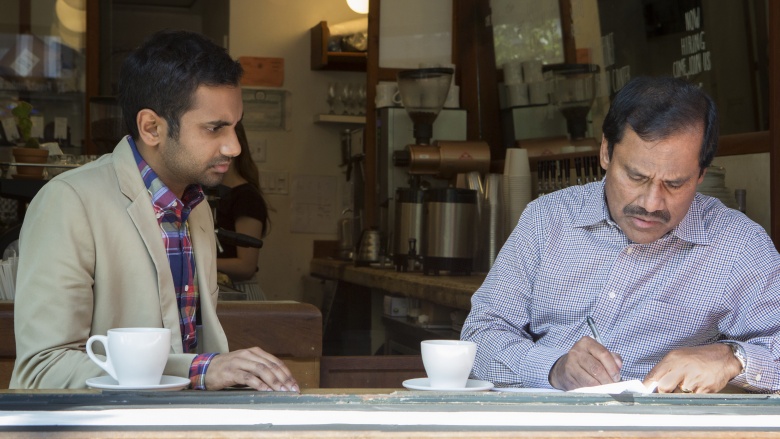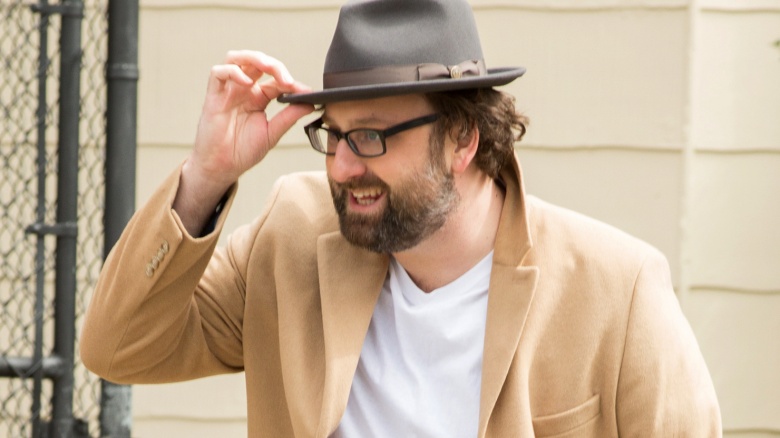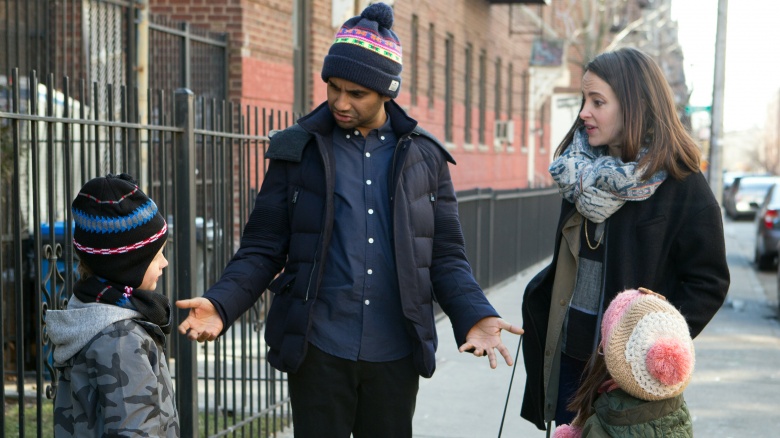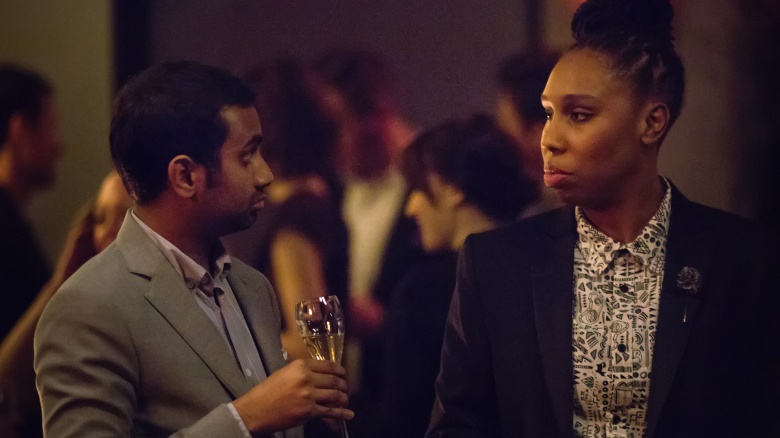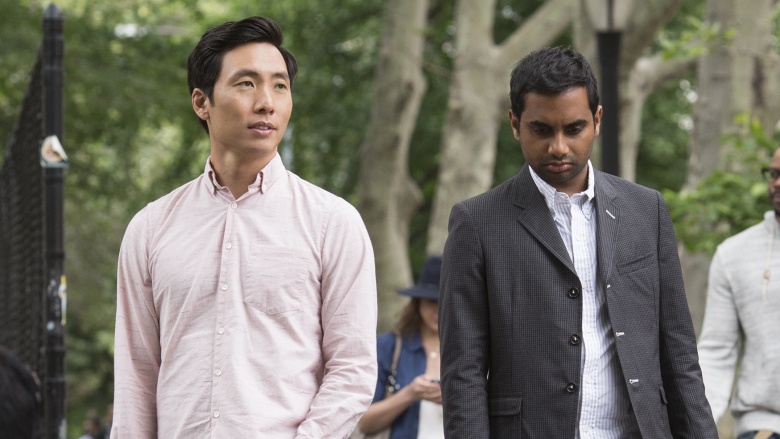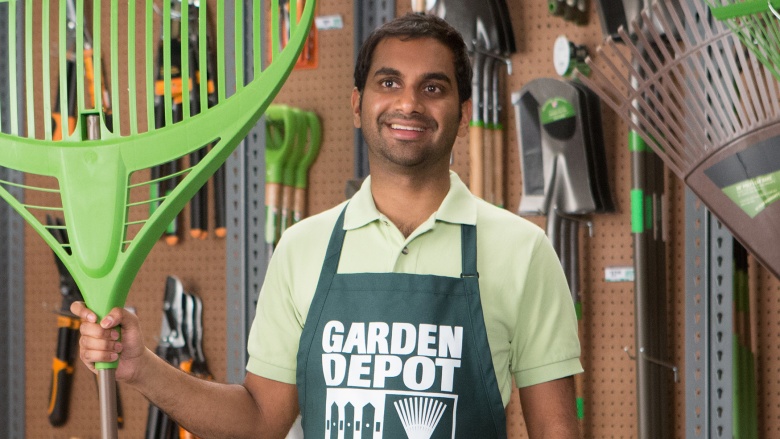Why Master Of None Is Way Worse Than Everyone Thinks
Aziz Ansari is one of the most successful stand-up comedians of his generation. He was also part of one of the most well-regarded comedy series in recent years, playing Tom Haverford on Parks and Recreation. When he teamed up with one of Parks' writers to create his own series for Netflix, it couldn't sound like a better idea. Unfortunately, the underwhelming result is Master of None, a navel-gazing glimpse into the life of an uninteresting character and his generally unlikable friends. Here are the areas where Master of None misses the mark.
The acting is hit or miss
With the exception of H. Jon Benjamin's few scenes, not a single actor on Master of None puts in a great performance. And Benjamin is only great because he's playing a barely fictionalized version of himself. Interestingly, what works for Benjamin is what undoes the rest of the cast. Their line delivery varies from cool detachment to ironic hyper-interest, but the joke-heavy dialogue doesn't support the delivery, so the whole thing feels forced. There might be one funny friend in a group who's constantly cracking zingers, but when everyone's doing it, it's exhausting and annoying. Aziz's lead character, Dev, also suffers from a stark lack of development, as a guy who's supposed self-awareness vanishes the instant something more interesting grabs his attention. This is Ansari's attempt at a character with more dimension than he's ever played before, and it's painfully obvious that he's not quite up to the task yet.
Eric Wareheim ruins every scene he's in
Fans of Tim and Eric Awesome Show, Great Job! will instantly recognize Eric Wareheim as Arnold on Master of None. Unfortunately, whenever Arnold starts speaking, those fans will immediately recoil at his hacky, over-the-top performance that's as awful as it is confusing. Playing some type of hipster weirdo that's a poorly done amalgam of Seinfeld's Cosmo Kramer and Silicon Valley's Erlich Bachman, Wareheim seems to pronounce every word of his dialogue like it's stuck to the inside of his mouth. His character is so bizarre that he's often met with either blank stares or no acknowledgement from the others at all, which begs the question: what is the point of him? Arnold seems to be the show's attempt at non sequitur, but he comes off more like a studio note suggesting the show needed a wacky sidekick.
It's Louie without the nuance and creative vision
Often compared to Louis C.K.'s award-winning comedy series, Louie, Master of None somehow strikes an entirely generic tone for a show about a similar character set in the same city. Through his own writing, directing, and editing, Louis C.K. creates a tangible world that's often as unsettling as it is hilarious. Whereas on Master of None, after a boring back-and-forth with someone, Dev literally says, "Well, that's the end of this interaction." We get that it's supposed to be ripping back the curtain of the dull social convention that is small talk, but isn't there a more clever way to do this? What's next, a blatant description of the special kind of magic Dev puts into his text messages? Oh wait, they did that, too.
The social commentary shoehorn
By the time each episode gets its random Tarantino-style intro out of the way (in one episode Dev and Arnold randomly spend several minutes dissecting Eminem's Lose Yourself) there's about 15 to 20 minutes left in the episode to tackle serious issues like the portrayal of women and minorities in media, or how little effort we make with older relatives. Where Louie creates multiple episode arcs with a character experiencing a change as a result of a personal encounter with these types of issues, Master of None either reverts to a physical gag (the robotic seal in "Old People") or falls completely flat attempting resolution (the philandering husband's speech in "The Other Man"). Maybe it's because the half hour run time restrains them from fleshing these themes out in an organic way, but it feels more like a case of a toddler trying to run before he learns to walk.
Hipster New York City
Master of None is the kind of show where the people walk through a barber shop to buy coffee at a tiny counter in the back without ever mentioning what an odd setup that is. Every apartment shown is huge and amazingly-appointed despite the fact that no one on the show is independently wealthy, a doctor, or in finance. The bars and parties are painfully cool and full of young, attractive people wearing vests and all sorts of accessories. For a series set in New York, this all seems too perfect. On an impromptu weekend trip to Nashville, Dev and Rachel go to a honky tonk bar to ironically mix it up with the locals. It would be spot-on satire if the show was making fun of twee hipster culture, but all of this is played completely, gag-inducingly straight. Oddly enough, it seems like the kind of environment Parks and Recreation's Tom Haverford dreams about living in, and if we're being perfectly honest, we'd swap a thousand Arnolds for even a picture of Jean-Ralphio on this show.
Binge-watching doesn't do it any favors
Consuming shows like House of Cards or Bloodline like guilty pints of Ben & Jerry's is what binge-watching is all about. Serialized shows, especially dramas, have cliffhangers and fast-paced narratives that drive one episode into another. Master of None has Dev talking to his friends. Sometimes, they sit in a coffee shop and talk. Other times, they walk down the street and talk. Though certain plot points get picked up in later episodes, each individual episode stands alone as a complete story. Unless you're dying to find out what the next bit of minutiae a bunch of 30-something Brooklyn hipsters will casually ponder, there's really no drive to click "play next." And the burnout rate of binging this show maxes out at two, maybe three, episodes at best before you can't take another second of people wearing cool hats discussing their favorite Alf episodes.

